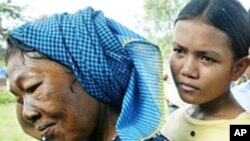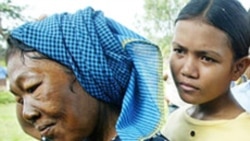Women and girls have a unique perspective on the causes and effects of conflict on the population. Yet they are often under-represented, or even denied any role in efforts to resolve hostilities and address their root causes, and on deciding how to rebuild society in a manner that promotes peaceful resolution to conflicts.
We have learned that if peace negotiations are to succeed, women must be fully involved in the process, said United States Agency for International Development, or USAID, Deputy Administrator Donald Steinberg.
Using the 1994 Angola Peace accords as an example, Deputy Administrator Steinberg described how the “exclusion of women and gender considerations from the peace process proved a key factor in [the] inability to implement the Protocol and in Angola's return to conflict in 1998.”
No women were included in the meetings, said Mr. Steinberg. Short shrift was given to violence against women, accountability for abuses by government and rebel security forces, trafficking in women and girls. No provisions were made for women who were kidnapped and coerced into participating in the conflict. Landmines were cleared from roads, but not from fields, wells and forests, where women worked, and as a result, died.
The peace process failed because it was “viewed as serving the interests of the warring parties rather than the Angolan people.”
In countries such as these affected by crisis and conflict, USAID is investing in the protection and empowerment of women and girls to foster peaceful, more resilient communities. The U.S. National Action Plan on Women, Peace, and Security, adopted in 2011, serves as a clear roadmap for our efforts.
For example, Deputy Administrator Steinberg announced in 2011 the new Global Women’s Leadership Fund, or GWLF, to support women’s participation in peace negotiations, political transition dialogues, and donor conferences.
In Syria, that fund enabled women leaders to create a network that advanced cooperation and joint advocacy. As a result, women are better linked with international decision makers and are receiving financial support for their relief and coordinating efforts.
USAID is also providing direct support for survivors of gender-based violence in crisis and conflict-affected communities through programs that help survivors access appropriate medical, psychosocial, legal, and economic services.
These are just some of the ways USAID is learning from the past to make a difference in the lives of women and their communities, around the world.
We have learned that if peace negotiations are to succeed, women must be fully involved in the process, said United States Agency for International Development, or USAID, Deputy Administrator Donald Steinberg.
Using the 1994 Angola Peace accords as an example, Deputy Administrator Steinberg described how the “exclusion of women and gender considerations from the peace process proved a key factor in [the] inability to implement the Protocol and in Angola's return to conflict in 1998.”
No women were included in the meetings, said Mr. Steinberg. Short shrift was given to violence against women, accountability for abuses by government and rebel security forces, trafficking in women and girls. No provisions were made for women who were kidnapped and coerced into participating in the conflict. Landmines were cleared from roads, but not from fields, wells and forests, where women worked, and as a result, died.
The peace process failed because it was “viewed as serving the interests of the warring parties rather than the Angolan people.”
In countries such as these affected by crisis and conflict, USAID is investing in the protection and empowerment of women and girls to foster peaceful, more resilient communities. The U.S. National Action Plan on Women, Peace, and Security, adopted in 2011, serves as a clear roadmap for our efforts.
For example, Deputy Administrator Steinberg announced in 2011 the new Global Women’s Leadership Fund, or GWLF, to support women’s participation in peace negotiations, political transition dialogues, and donor conferences.
In Syria, that fund enabled women leaders to create a network that advanced cooperation and joint advocacy. As a result, women are better linked with international decision makers and are receiving financial support for their relief and coordinating efforts.
USAID is also providing direct support for survivors of gender-based violence in crisis and conflict-affected communities through programs that help survivors access appropriate medical, psychosocial, legal, and economic services.
These are just some of the ways USAID is learning from the past to make a difference in the lives of women and their communities, around the world.






